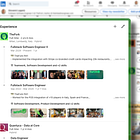This tip will change FOREVER your career 🔥
How to turn your experience into undeniable proof of impact
Let’s talk about storytelling: the story that each of us tells when we build our profile, our CV, our portfolio, the website, etc…
Of course, there are many different styles, keywords, or general strategies that can be used.
However, I believe there’s one specific killer tip that each Software Engineer should use, when talking about themselves.
Ready?
Make your storytelling data-driven. Always.
Why this changes everything
Most developers write vague descriptions of what they’ve done:
“Worked on frontend development for the internal dashboard.”
“Improved the backend API for better performance.”
“Collaborated with the product team to deliver new features.”
Do these sentences tell the truth? Probably.
But do they stand out or prove your value to someone reading in a hurry? Not at all.
Now look at this instead:
“Built internal dashboard used daily by 40+ employees, reducing report generation time from 10min to under 30sec.”
“Optimized backend API, reducing average response time by 45% and cutting cloud costs by 20%.”
“Delivered 8+ product features that contributed to a 15% increase in user engagement within 3 months.”
Boom.
Same work, but now it looks solid, specific, and high-impact.
Why? Because it’s measurable. And in storytelling, what gets measured, gets remembered.
Show the business value, not just the tech impact
Writing about speed, usage, or reliability is great.
But when you manage to tie your work to a business outcome, that’s next-level.
For example:
❌ Instead of:
“Optimized database queries, reducing latency”
✅ Say:
“Optimized database queries, reducing latency by 40% and cutting cloud DB costs by ~€800/month.”
Or:
❌ Instead of:
“Refactored checkout flow to be faster.”
✅ Say:
“Refactored checkout flow, reducing friction and contributing to a +6% conversion rate — directly impacting revenue.”
Even if you’re not in sales or growth, your work has consequences on the business. Learn to trace the line:
Did you speed up a key internal tool? → That saves employee time → That reduces costs.
Did you improve system stability? → Less downtime → Happier users → Retention & reputation.
Did you ship a product faster than expected? → Time to market advantage → Potential revenue sooner.
📌 When you highlight the business value, you show you're not just coding — you’re creating leverage.
And that's exactly the kind of developer companies fight to hire.
How to rewrite your experience like a pro
Use this simple formula:
Action + Metric + Result
Examples:
❌ Don’t say:
“Wrote tests for the codebase.”
✅ Say:
“Increased test coverage from 65% to 93%, reducing bugs in production by 30% over 6 months.”
❌ Don’t say:
“Migrated infrastructure to Kubernetes.”
✅ Say:
“Led infrastructure migration to Kubernetes, improving deployment speed by 5x and reducing downtime incidents from weekly to near-zero.”
But… “I don’t have the numbers!”
Yeah, I hear this a lot. Here’s how to work around it:
1. Ask your team or manager
You'd be surprised how often this data exists. Just ask:
How many users are we serving?
What was the performance gain after X?
How often is this tool being used?
2. Get the data yourself
As developers, we often have access to tools like Snowflake, Datadog, BigQuery, Kibana, etc.
But we usually query them only when someone asks for metrics.
👉🏻 Start doing it for yourself.
Make it a habit to measure the impact of what you build.
You built a feature? Go check:
How many people used it?
How often is it triggered?
Did it reduce errors or increase speed?
Being able to quantify your own work is one of the most underrated superpowers in this field.
3. Use public or estimated data
If you built an integration with Shopify, and you know Shopify stores typically handle thousands of orders/month, you can say:
“Built a Shopify integration used in a store processing ~10K orders/month.”
Or if your app was deployed company-wide, and you’re at a 200-person company:
“Developed internal tooling adopted across 200+ employees.”
4. Use before/after comparisons
Even relative improvements are powerful:
“Reduced page load time by 60%.”
“Cut error rate by half.”
“Improved deploy time from 20min to under 3min.”
Even without absolute numbers, direction and impact matter.
Why this makes you magnetic on LinkedIn (and beyond)
Recruiters scan profiles in seconds — numbers catch their eye.
Data shows you’re serious, analytical, and results-oriented.
It shifts the narrative: from tasks you did → to value you delivered.
It instantly builds credibility and trust.
And trust me: in a sea of generic buzzwords, being specific makes you unforgettable.
Try this today
Go to your LinkedIn or CV.
Pick one bullet point from your “Experience” section.
Rewrite it using:
An action verb
A metric or estimate
A business result or clear impact
Just one line. Do it today.
You’ll see how powerful it feels.
And hey — if you missed my previous piece on how to structure your Experience section like a story, read it here
Stay sharp.



